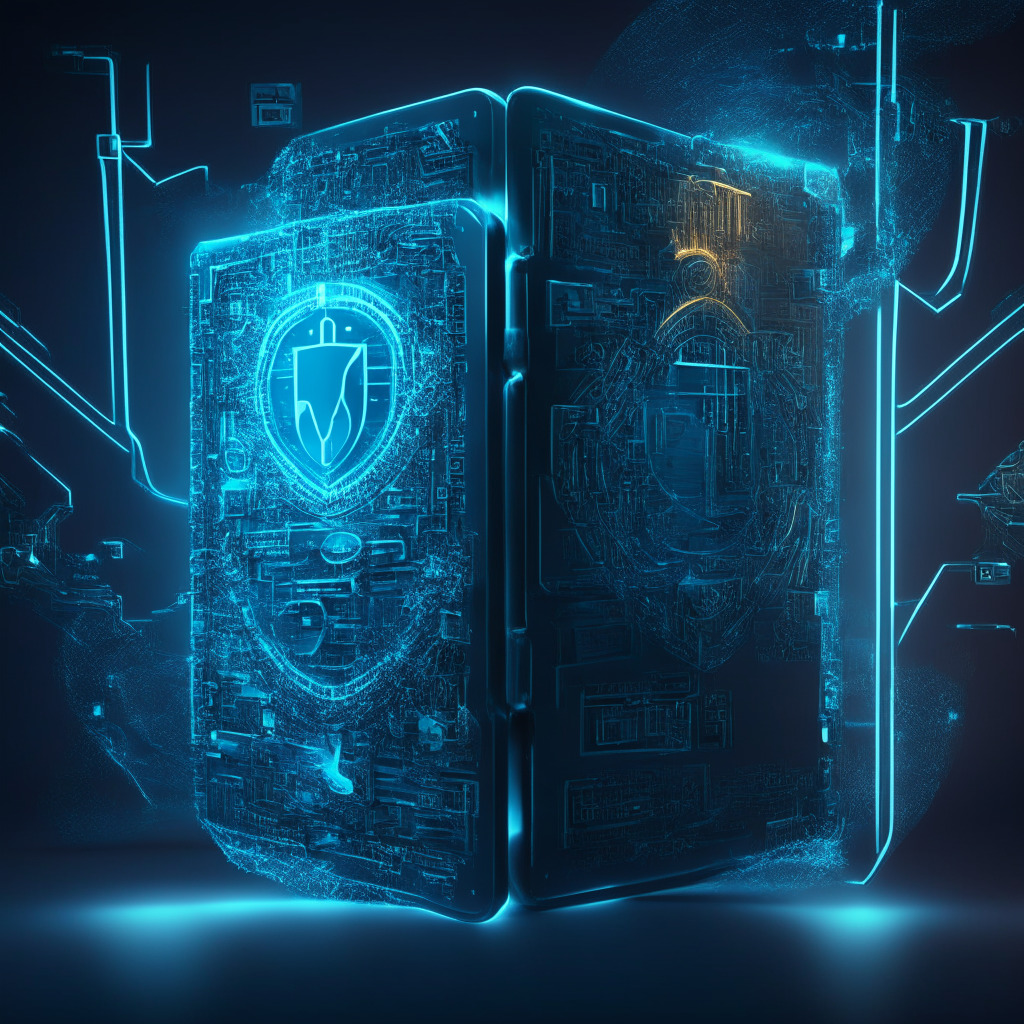“Zodia Custody, a subsidiary of Standard Chartered, now offers digital asset custody services in Singapore, anticipating growing investment as regulations evolve. This move, along with its current registrations in U.K., Ireland, Luxembourg, and a pending application in Japan, signifies its global ambitions in the cryptocurrency sphere. Balancing regulatory respect, innovation, and stakeholder interests is crucial.”
Category: Technology
Reviving BIP-300: A Game Changer or Threat to Bitcoin’s Success?
The Bitcoin community is revisiting BIP-300, a Bitcoin Improvement Proposal, that suggests using sidechains to allow BTC to move onto separate blockchains within the Bitcoin network. While some praise the proposal’s potential benefits, like choosing blockchain security models, others express concerns about inadvertently encouraging scams and drawing unwanted regulatory attention. This underscores a bigger question about the future of Bitcoin.
AI-Centric Crypto Projects: The Future is Here, Navigating Opportunities and Risks in the Blockchain Universe
“AI-driven crypto projects like Render, Fetch.ai, and yPredict offer more than just crypto market stability amidst uncertain economic times. They solve real-world problems, integrate advanced technologies, and nudge the crypto and AI sphere forward, improving functionality and solving practical issues.”
Navigating Privacy: Google’s Privacy Sandbox and the Future of Online Advertising
Google Chrome has unveiled a new ad-curating platform, “Privacy Sandbox,” aimed at eliminating reliance on third-party cookies and fingerprinting. This move, regarded as a significant shift in internet advertising, has sparked mixed reactions over its effectiveness in enhancing user privacy. The balance between targeted advertising and privacy remains a contentious industry issue.
SushiSwap Expands to Aptos: A Reworked View on Decentralized Exchange Landscape
“SushiSwap, a reputed decentralized digital asset exchange, has expanded its operations to Aptos, a layer 1 blockchain, marking its first integration outside Ethereum Virtual Machine (EVM) compatibility. The move aims to bolster SushiSwap’s multi-chain network strength while providing fresh capital to Aptos, helping it compete against other non-EVM blockchains.”
Google’s Digital Futures Project: A Beacon for Ethical AI or Deflection Strategy?
Google’s Digital Futures Project aims to promote the secure, responsible use of AI through research and collaboration with think tanks and academic institutions. However, skeptics question potential conflicts of interest, highlighting the need for transparency in its operations.
Noncustodial Liquidity Markets: Bridging Decentralized Finance with Seamless Lending & Borrowing
A Layer-2 network known as Base introduces noncustodial liquidity markets, changing the traditional ‘trust humans over algorithms’ dynamic. This innovation allows smart contracts to connect liquidity pools with borrowing strategies and promotes transparency. The Seamless Protocol enables streamlined undercollateralized borrowing, minimizing complexity and challenges usually associated with typical DeFi loans.
Riding the Crypto Storm: The Tale of Maple Finance, DeFi and Risk Management
Late in 2021, Maple Finance introduced a digital lending protocol promising token-skeptical institutions a share of Alameda Research’s trading profits. However, the crypto downfall in 2022 caused a significant impact on Maple, highlighting the inherent vulnerability of the DeFi space and the need for stringent risk management practices.
Navigating Japan’s Crypto Future: A Tale of Opportunities, Challenges, and Innovation
“Kei Oda, former Goldman Sachs trader and current head of Quantstamp Asia-Pacific, discusses his journey into blockchain and crypto trading. Despite setbacks and high taxation, he recognizes the vibrancy of Japan’s crypto ecosystem, its appeal to startups, and potential for revolutionary uses like Ethereum. Furthermore, Oda expresses confidence in Japan’s balancing act in crypto regulation, inspiring interest even from its largest banking conglomerate.”
Redefining Consumer-Brand Relationships: Wallet 3.0, Privacy and the Future of Engagement
“Wallet 3.0, Web3’s killer application, is reshaping customer-brand engagement towards a more privacy-centric experience enabled by decentralized tech. Brands are recognizing the need for transparency and user privacy, transitioning to user-owned, NFT-enabled wallets for more direct and trustworthy interactions, leading to enhanced loyalty, lower CAC, and improved CLTV.”
Fireblocks’ Non-Custodial Wallets: Shaping the Future of Digital Asset Control and Security
Cryptocurrency custody firm Fireblocks, in response to market leaders’ high-profile collapses, introduces a non-custodial wallet service, giving users control over their cryptographic keys. Adopting a fully non-custodial setup empowers users, bypasses regulatory restrictions and potentially revolutionizes fintech and blockchain technology’s future.
Navigating the Dilemmas of Animoca Brands’ Mocaverse: Blockchain Innovation or Digital Disparity?
“Animoca Brands has declared a funding round closure for the development of ‘Mocaverse,’ a new platform for online gaming, culture, and entertainment using DAO-based approach. Yet, this promising venture raises concerns over privacy, security, and potential centralization of the decentralized Web3.”
Friend.tech: From Dips to Triumphs – The Decentralized Social Media Platform’s Resurrection
“The once doubted decentralized platform Friend.tech has experienced immense growth recently, with a surge in its Total Locked Value (TVL) reaching $20 million. Despite initial skepticism, it now stands as the third highest revenue-generating decentralized application in the DeFi ecosystem. With active updates and a creator-first approach, this might be the beginning of a sustainable growth journey.”
Sushi’s Blockchain Leap: Breaking Boundaries or Overextending its Reach?
Decentralized exchange Sushi is extending its services to non-Ethereum Virtual Machine compatible blockchain, Aptos, marking a major development. This strategic move could potentially attract fresh capital towards Aptos while enhancing cross-chain trading experiences and opening up new possibilities for liquidity across major blockchain networks.
Meta’s AI Showdown: A Winsome Leap Forward or a Costly Misstep?
“Meta plans to develop an advanced AI model, potentially surpassing OpenAI systems. However, concerns arise around data center construction, chip supply, and ethical issues. Interestingly, AI and crypto’s convergence could pave the path to a tech-advanced future, but with challenges.”
Regulating Crypto and AI: Balancing Technological Innovation with Global Cooperation
“The G20 nations emphasize the need for responsible growth and use of AI, recognizing the potential of crypto assets and digital currencies in fostering a digital world. They propose a global crypto framework to navigate challenges like data protection, potential biases, and human oversight, advocating for a more homogeneous approach in the disjointed global landscape.”
India’s Ambitious Plan: One Million CBDC Transactions by 2023 with Digital Rupee and UPI Integration
The Reserve Bank of India (RBI) is planning to increase daily retail Central Bank Digital Currency (CBDC) transactions from an average of 18,000 to one million by the end of 2023. RBI is also encouraging banks to facilitate e-rupee compatibility with Unified Payments Interface via QR codes for seamless transactions.
Arbitrum’s Unused Fraud Proofs: A Testament to Security or Flawed Utilization?
“In the blockchain technology stakes, maintaining security and preventing fraudulent activity is key, with protocols like Arbitrum’s fraud proofs playing a significant role. Surprisingly, according to Offchain Labs, these fraud proofs haven’t been used since the protocol’s launch two years ago, due to a combination of strong deterrent measures and the risk to validators.”
The Evolution of Cross-Chain Interoperability: A Game-Changer or a Destined Failure?
“Blockchain networks may face growth obstacles due to “chain tribalism”, resistance to cross-chain collaboration. However, a shift towards chain interoperability, or different blockchains interacting, is expected by 2023. Notable upcoming developments aim to enhance this interoperability, although existing methods risk security breaches and require improvement.”
Casio’s Dive into NFTs: Innovative Approach or Marketing Strategy?
“Blockchain technology has enabled a new form of virtual ownership, NFTs. Notable brands like Casio are utilizing this tech, releasing 3D model G-Shock NFTs as a novel blending of loyalty programs and blockchain. However, whether this represents innovation or a simple marketing ploy remains to be seen.”
Exploring the Political Spectrum: The Rising Influence of Bitcoin Mining and Cryptocurrencies
Senator Ted Cruz endorses Bitcoin, highlighting its potential in bolstering energy grid resilience—an advantage in emergencies, such as the recent Texas extreme weather. The stance reflects the growing influence of digital currencies, despite potential hurdles and economic turbulence.
The Dawn of Gasless USDC Transactions: OKX and Circle Internet Financial’s Game-Changing Launch
“OKX and Circle Internet Financial have launched USDC features on OKX Wallet and the OKX DEX aggregator, enabling gasless USDC transactions and abolishing network fees for cross-chain exchanges. This advancement denotes a significant stride towards easy-to-use, permissionless on-chain utility. The move also signifies stablecoins’ growing influence in the fiscal ecosystem.”
NounsDAO’s Treasury Split: Unraveling the Rage Quit Phenomena in DAOs
NounsDAO, a key NFT player, faces potential treasury split driven by unsatisfied holders seeking better returns. Newly approved guidelines allow a ‘fork’ leading to an operational split. The situation highlights similar ‘rage quits’ within decentralized autonomous organizations (DAOs) as investor faith wavers.
How WriteMingle and yPredict are Transforming AI Applications and Blockchain Investment
WriteMingle, an AI-powered software application from yPredict, is set to revolutionize strategic content creation and management. Its features include real-time grammar and plagiarism checks, SEO tools, content quality gauging, and workflow management. The software, still in beta testing, is already drawing significant attention in the crypto market.
Harnessing AI to Mirror Bias: The Case of OpinionGPT and Its Limitations
Researchers at Humboldt-Universität zu Berlin have developed an AI model, ‘OpinionGPT’, trained on Reddit data to reflect bias from certain demographic groups. However, the model encounters criticism for its questionable accuracy in representing real-world biases, indicating a representation of Reddit stereotypes rather than wider demographic sentiment.
SEC Approval for Nasdaq’s AI-driven Trading: A Leap or a Stumble?
“Nasdaq receives unprecedented SEC approval to use artificial intelligence for trade execution. This real-time reinforcement learning AI-driven order system, distinct from traditional automation, recalibrates in response to market conditions, potentially speeding up trading. However, concerns about integrity and regulatory hurdles persist.”
Revolutionizing the Freelance World with Cryptocurrencies: A Boon or a Bane?
Using cryptocurrencies for payments in the freelance industry overcomes significant obstacles imposed by traditional banks such as high transaction fees, poor conversion rates and slow processing times. Cryptocurrencies also provide freelancers with more control over their finances, enhanced transaction transparency, and improved account security.
South Korea’s Mirae Asset Securities Collabs with Polygon Labs to Tokenize Assets: Will this Disrupt the Traditional Financial Landscape?
Mirae Asset Securities collaborates with Polygon Labs to facilitate tokenization and Web3 integration with traditional finance. This alliance aims to create an infrastructure for issuing and transacting tokenized securities – translating tangible assets into blockchain-backed cryptographic tokens. The partnership anticipates reshaping capital markets by eliminating intermediaries, promising a more efficient, transparent, and inclusive global financial system.
AI Influence on Social Media: A Threat to Democratic Elections or an Essential Tool for Hazard Detection?
“Artificial Intelligence (AI) applications may manipulate voter sentiment in the 2024 U.S elections, posing threats to democratic processes. Despite being a potential tool for propaganda, AI is also being employed to detect and counter disinformation threats on social media.”
Navigating Web3 Opportunities: The Emergence of Blockchain Gaming in Saudi Arabia’s Vision 2030
“Saudi Arabia’s shift from an oil-dependent economy to investing in blockchain gaming and Web3 captures attention. This redraws its economic blueprint under its ambitious Vision 2030 plan. With gaming sector investments on the rise, the kingdom seeks to explore the new internet wave, potentially positioning it as a global gaming hub.”
Dipping Traffic for AI Chatbot: A Seasonal Fluctuation or a Larger Concern for the Academic Sector?
While user traffic to AI chatbot, ChatGPT, decreased globally for the third consecutive month in August, there are signs of growth in US visitation. Traffic fluctuations may be due to seasonal variations, such as university summer breaks, with drop in use particularly noticeable in younger demographics. However, inconsistencies in unique visitor data present further questions about actual user demographics and motivations. Despite declining visits, AI chatbots remain valuable in academics among other sectors.
Southeast Asian Super App Grab Launches Blockchain Wallet and NFT Vouchers: A Brave Step or Casual Ripple?
Southeast Asian super app Grab, in collaboration with the Monetary Authority of Singapore (MAS), is venturing into the realm of blockchain technology and non-fungible tokens (NFTs). They have unveiled a unique Polygon-based Web3 wallet and NFT vouchers, which serve as digital collectibles and can be used for various services across Singapore. While the project holds promise, questions about its feasibility and the security of these digital assets persist.






























